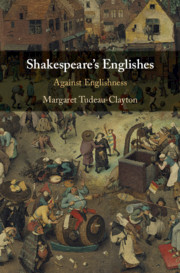
- Cited by 2
-
Cited byCrossref Citations
This Book has been cited by the following publications. This list is generated based on data provided by Crossref.
Wagoner, Michael M. 2024. Listening to First Quartos: The Women of The Merry Wives of Windsor and Henry V . Shakespeare, p. 1.
Taylor, Gary 2024. Transeditions: Shakespeare’s two french english lessons. Letras, p. 3.
- Publisher:
- Cambridge University Press
- Online publication date:
- October 2019
- Print publication year:
- 2019
- Online ISBN:
- 9781108643245




